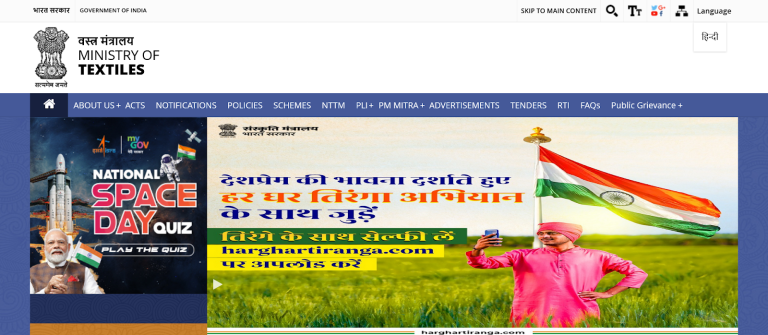The Ministry of Textiles recently disbursed nearly INR 50 Lakh each to four startups under the GREAT scheme for Grant for Research & Entrepreneurship across Aspiring Innovators in Technical Textiles. The rationale behind this move is to cater to Entrepreneurship and innovations in the technical textiles sector.
Startups and Market Potential
Four companies will be receiving grants and the names and details of the grantees are provided in the column below. These will be used for research and business innovations in the technical textile sector. Startups will focus on composite projects, sustainable textile projects, and smart textile projects. The Indian technical textile industry is expected to grow at a faster pace and reach a market size of $ 309 billion by 2047. Such grants will foster innovation and help the growth of the industry.
National Technical Textiles Mission (NTTM)
The GREAT scheme is a part of an initiative called the National Technical Textiles Mission. The mission aims to bring about enhanced levels of development of the technical textile industry in India. National Technical Textiles Mission (NTTM) is a joint venture of the Ministry of Textiles, the Government of India & the World Bank. The main focus of the policy is to target an international brand image of India in Technical Textiles by lifting the domestic market value from USD 40 billion to USD 50 billion by 2024.
The NTTM is rooted in the primary of establishing specialty fibers and geotextiles via twenty significant research initiatives. These projects are meant to improve the level of technical textiles and increase the level of textile production within the country.
The mission supports the Make in India campaign, which promotes the domestic manufacture of technical textiles. Some of these textiles have utilitarian uses and are not confined to beautification. The NTTM was established to serve the purpose of promoting and supporting India’s technical textiles industry and its growth.
Empowered Programme Committee (EPC)
The grants were passed during the 8th EPC meeting under the National Technical Textiles Mission. The latest meeting was presided over by the Secretary of the Textiles Ministry of the respective country. It reviews all the proposals presented to the Mission Steering Group (MSG). This forum has to endorse any proposal it deems fit to be passed to the MSG after the EPC has reviewed it. They underscore the need for a rigorous examination and assessment of health-related initiatives and projects by the EPC.
The EPC comprises members including health professionals. Two nominees as EPC members are the two public health professionals for two years. The premier of the EPC has the power to adjust any financial standard set by the MSG with variation limits of between 25%. Larger variations need the approval of the MSG. Annual progress reports covering NHM and its implementation, changes in financial standards, revisions in ongoing programs, and essential information about new programs are submitted to the Cabinet.
Conclusion
The support from the government through these grants will enable startups to spearhead change in technical textiles hence implementing sustainable and innovative solutions. All these initiatives are important in defining the future of this industry as it continues to grow.

Note: You can reach us at support@scoopearth.com with any further queries.
Linkedin Page : https://www.linkedin.com/company/scoopearth-com/













